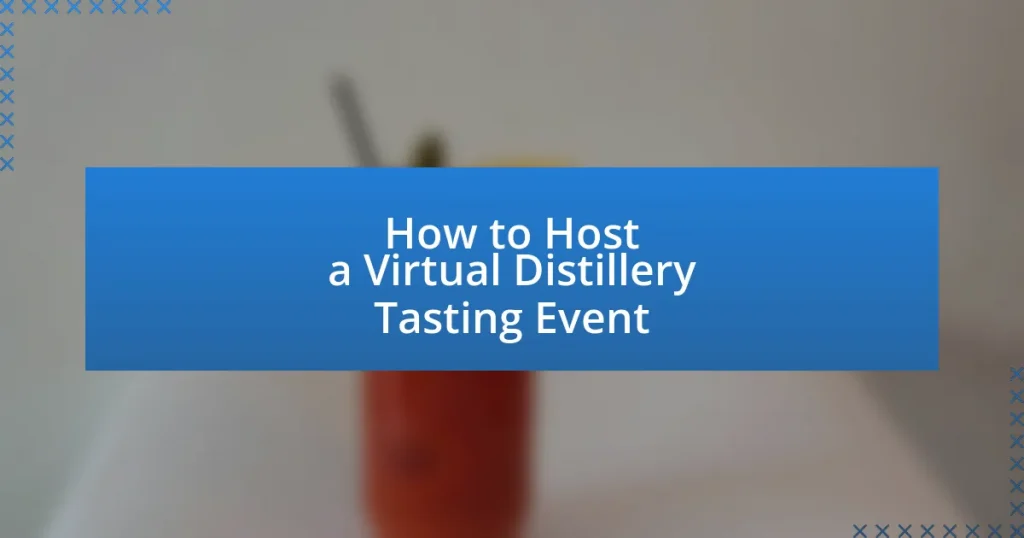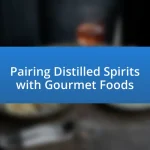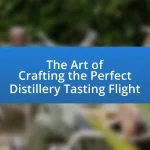A Virtual Distillery Tasting Event is an online experience where participants sample various spirits guided by an expert, typically involving pre-selected tasting kits. This article outlines the differences between virtual and traditional tastings, the technology required for hosting, and the best platforms for conducting these events. It also discusses the growing popularity of virtual tastings due to their accessibility and convenience, along with strategies for planning, promoting, and enhancing participant engagement. Additionally, the article addresses common challenges and offers best practices for creating a successful virtual tasting experience.
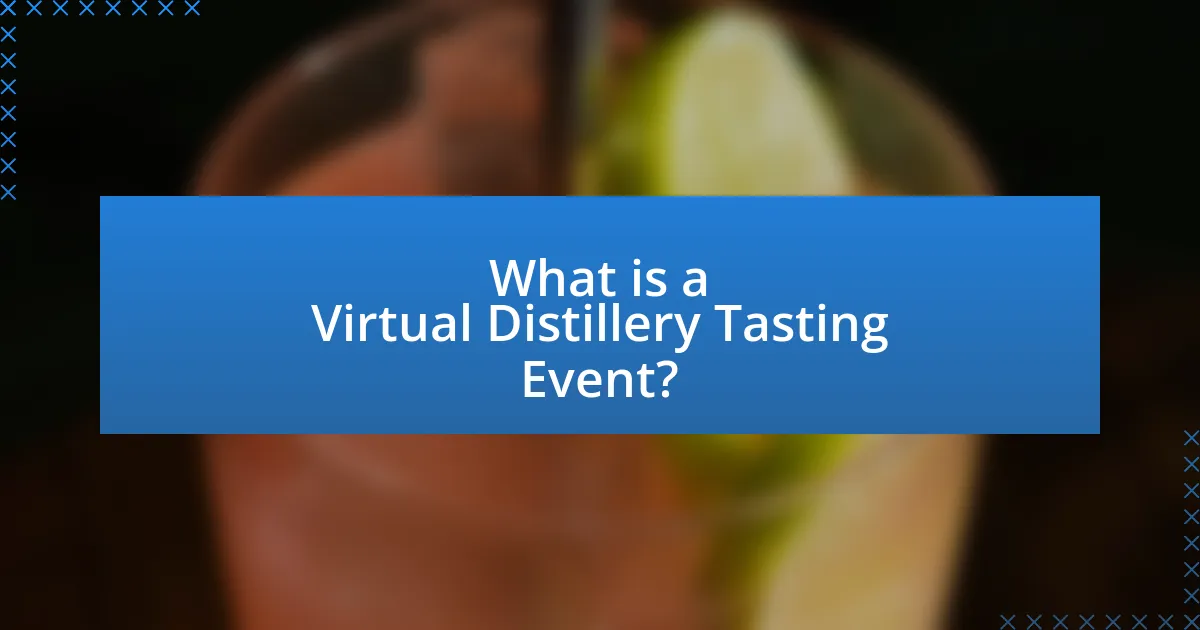
What is a Virtual Distillery Tasting Event?
A Virtual Distillery Tasting Event is an online gathering where participants sample and evaluate various spirits, guided by a distillery representative or expert through a digital platform. This format allows individuals to experience the nuances of different liquors from the comfort of their homes, often involving pre-selected tasting kits sent to attendees in advance. The event typically includes discussions about the production process, flavor profiles, and the history of the spirits being tasted, enhancing the educational aspect of the experience.
How does a virtual distillery tasting event differ from a traditional tasting?
A virtual distillery tasting event differs from a traditional tasting primarily in its format and accessibility. In a virtual tasting, participants join remotely via video conferencing platforms, allowing for a broader audience regardless of geographical location, while traditional tastings typically occur in-person at a specific venue. Virtual events often require participants to pre-purchase tasting kits that are shipped to their homes, whereas traditional tastings provide immediate access to the spirits on-site. This shift to a digital format has been accelerated by advancements in technology and the need for social distancing, making virtual tastings a flexible alternative that can accommodate larger groups and diverse participants.
What technology is required for hosting a virtual distillery tasting event?
To host a virtual distillery tasting event, essential technology includes a reliable video conferencing platform, such as Zoom or Microsoft Teams, to facilitate live interaction among participants. Additionally, high-quality audio and video equipment, including microphones and cameras, are necessary to ensure clear communication and an engaging experience. A stable internet connection is crucial to prevent disruptions during the event. Furthermore, using presentation software can enhance the experience by displaying tasting notes and visuals related to the distillery products. These technologies collectively create an immersive and interactive environment for participants, enabling them to enjoy the tasting experience remotely.
What platforms are best suited for virtual tastings?
The best platforms for virtual tastings include Zoom, Microsoft Teams, and Google Meet. These platforms offer features such as video conferencing, screen sharing, and chat functionalities, which enhance the interactive experience of virtual tastings. For instance, Zoom supports up to 1,000 video participants and provides breakout rooms for smaller group discussions, making it ideal for engaging participants in a distillery tasting event. Microsoft Teams integrates well with other Microsoft applications, allowing for seamless sharing of tasting notes and materials. Google Meet is user-friendly and accessible, requiring no downloads for participants, which can increase attendance rates.
Why are virtual distillery tasting events becoming popular?
Virtual distillery tasting events are becoming popular due to their accessibility and convenience, allowing participants to engage from the comfort of their homes. This format eliminates geographical barriers, enabling people from different locations to join the same event, which has been particularly appealing during times when in-person gatherings are limited. Additionally, the rise of online platforms has facilitated seamless interactions and enhanced experiences, making it easier for distilleries to reach a broader audience. According to a survey by Eventbrite, 70% of respondents expressed interest in attending virtual events, highlighting the growing trend and acceptance of this format in the beverage industry.
What advantages do virtual tastings offer to participants?
Virtual tastings offer participants the advantage of accessibility, allowing them to join from any location without the need for travel. This format enables a wider audience to engage with the tasting experience, as individuals can participate from the comfort of their homes. Additionally, virtual tastings often provide a diverse selection of products, as participants can sample items from various distilleries that may not be locally available. The interactive nature of virtual tastings, facilitated through video conferencing, allows for real-time engagement with hosts and other participants, enhancing the overall experience. Furthermore, virtual tastings can be more cost-effective, as they typically eliminate expenses related to venue rental and transportation.
How do virtual events expand the audience for distilleries?
Virtual events expand the audience for distilleries by removing geographical barriers, allowing participation from individuals who may not have access to physical locations. This inclusivity enables distilleries to reach a global audience, significantly increasing their visibility and potential customer base. For instance, a virtual tasting event can attract participants from various regions, leading to higher engagement and sales opportunities. Additionally, data from the 2021 Virtual Events Industry Report indicates that 67% of marketers believe virtual events can reach a wider audience compared to in-person events, reinforcing the effectiveness of this approach for distilleries.
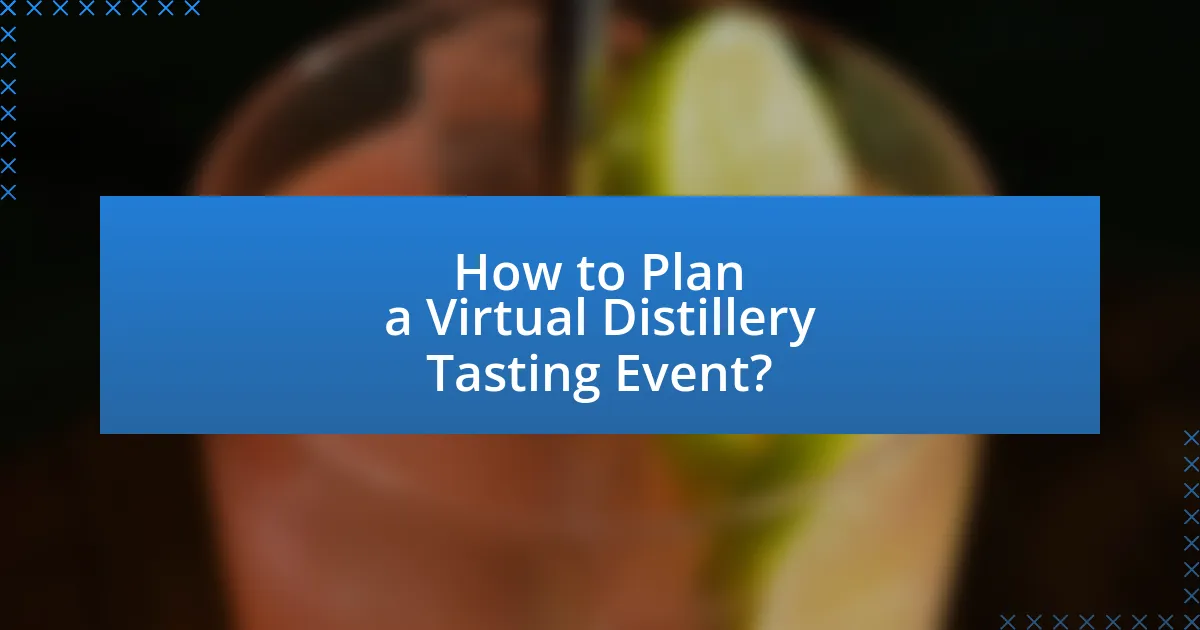
How to Plan a Virtual Distillery Tasting Event?
To plan a virtual distillery tasting event, first select a suitable platform for hosting, such as Zoom or Microsoft Teams, which allows for video conferencing and interaction. Next, curate a selection of spirits to be tasted, ensuring participants receive samples in advance, ideally with a tasting kit that includes detailed information about each spirit. Schedule the event at a time convenient for all participants, and promote it through social media or email to maximize attendance. Finally, prepare an engaging agenda that includes guided tastings, discussions about the distillation process, and opportunities for participants to ask questions, enhancing the overall experience.
What steps are involved in organizing a successful virtual tasting?
To organize a successful virtual tasting, follow these steps: first, select a theme or focus for the tasting, such as a specific type of spirit or region. Next, choose a date and time that accommodates your target audience, ensuring to consider different time zones. Then, curate a selection of products for participants to taste, ensuring they are accessible for purchase or distribution. After that, create a detailed invitation that includes the theme, date, time, and a list of products to be tasted, along with any necessary links for purchasing.
Subsequently, set up a reliable virtual platform that supports video conferencing and interaction, such as Zoom or Microsoft Teams. Prepare an engaging agenda that includes introductions, tasting notes, and interactive segments to keep participants engaged. Finally, conduct a test run to troubleshoot any technical issues and ensure a smooth experience on the day of the event. These steps are essential for creating an engaging and memorable virtual tasting experience.
How do you select the right distillery products for the event?
To select the right distillery products for the event, first assess the theme and audience preferences. Understanding the demographic and interests of the attendees allows for tailored selections that enhance engagement. For example, if the audience consists of whiskey enthusiasts, curating a range of single malts and blends from various regions can provide a comprehensive tasting experience. Additionally, consider the availability and quality of products; sourcing from reputable distilleries ensures authenticity and satisfaction. Researching product reviews and ratings can further validate choices, as high-rated products are more likely to resonate with participants.
What is the ideal timeline for planning a virtual tasting event?
The ideal timeline for planning a virtual tasting event is approximately 6 to 8 weeks prior to the event date. This timeframe allows for adequate preparation, including selecting the theme, sourcing products, and promoting the event. For instance, securing partnerships with distilleries and arranging for product delivery should occur at least 4 to 6 weeks in advance to ensure all materials are received on time. Additionally, marketing efforts should begin 4 weeks prior to the event to maximize attendance, utilizing social media and email campaigns to reach potential participants effectively. This structured approach ensures a well-organized and successful virtual tasting experience.
How do you promote a virtual distillery tasting event?
To promote a virtual distillery tasting event, utilize targeted social media advertising to reach potential attendees. Platforms like Facebook and Instagram allow for demographic targeting, ensuring that the event is visible to individuals interested in spirits and tasting experiences. Additionally, create engaging content such as teaser videos or behind-the-scenes looks at the distillery to generate excitement. Email marketing can also be effective; sending invitations to existing customer lists and local community members can increase attendance. Collaborating with influencers in the spirits industry can further amplify reach, as they can share the event with their followers, providing social proof and credibility.
What marketing strategies are effective for virtual tastings?
Effective marketing strategies for virtual tastings include leveraging social media platforms, email marketing, and partnerships with influencers. Social media platforms like Instagram and Facebook allow for targeted advertising and engagement with potential participants, increasing visibility and interest. Email marketing can be utilized to reach existing customers and provide them with exclusive offers or early access to virtual tasting events, enhancing customer loyalty. Collaborating with influencers in the food and beverage industry can also expand reach, as they can promote the event to their followers, driving attendance and participation. According to a study by HubSpot, businesses that prioritize social media marketing experience a 13% increase in ROI, highlighting the effectiveness of these strategies in promoting virtual tastings.
How can social media be leveraged to attract participants?
Social media can be leveraged to attract participants by creating engaging content that highlights the unique aspects of the virtual distillery tasting event. Utilizing platforms like Instagram and Facebook allows organizers to share visually appealing images and videos of the distillery, the tasting process, and the products being featured, which can generate interest and excitement.
Additionally, targeted advertising on these platforms can reach specific demographics interested in spirits and tasting events, increasing the likelihood of attracting participants. According to a study by Sprout Social, 79% of consumers prefer to engage with brands on social media, indicating that effective social media strategies can significantly enhance participant engagement and attendance.
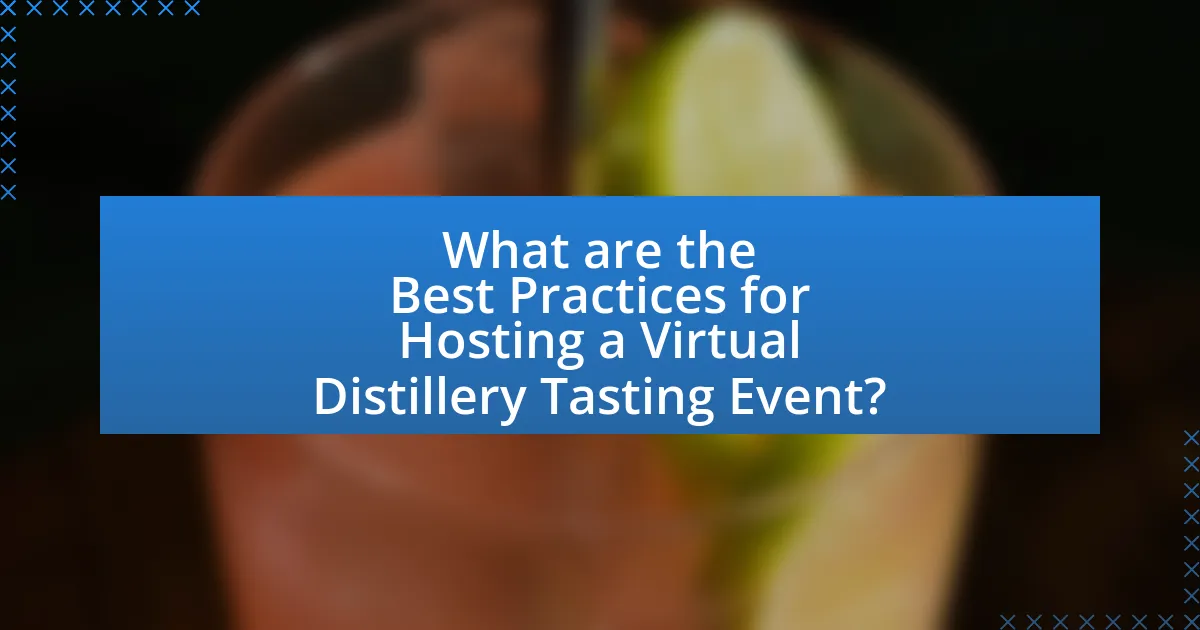
What are the Best Practices for Hosting a Virtual Distillery Tasting Event?
The best practices for hosting a virtual distillery tasting event include selecting a suitable platform, preparing tasting kits, engaging participants, and providing educational content. Selecting a reliable video conferencing platform, such as Zoom or Microsoft Teams, ensures a smooth experience for attendees. Preparing tasting kits with samples of the spirits, along with tasting notes and pairing suggestions, enhances the tasting experience. Engaging participants through interactive elements, such as polls or Q&A sessions, fosters a sense of community. Providing educational content about the distillation process and the specific spirits being tasted adds value and enriches the experience. These practices are supported by successful virtual events that have seen increased participant satisfaction and engagement.
How do you create an engaging experience for participants?
To create an engaging experience for participants in a virtual distillery tasting event, utilize interactive elements such as live polls, Q&A sessions, and breakout discussions. These features encourage active participation and foster a sense of community among attendees. Research indicates that interactive formats can increase engagement levels by up to 70%, as participants feel more involved and connected to the content and each other. Additionally, incorporating storytelling about the distillery’s history and the production process enhances the emotional connection, making the experience more memorable.
What role does the host play in facilitating the tasting?
The host plays a crucial role in facilitating the tasting by guiding participants through the experience, ensuring engagement, and providing informative commentary. The host sets the tone for the event, introduces the spirits being tasted, and shares relevant background information about each one, such as production methods and flavor profiles. This engagement enhances the participants’ understanding and enjoyment of the tasting, making it a more immersive experience. Additionally, the host manages the flow of the event, encourages interaction among participants, and addresses questions, which fosters a sense of community and connection during the virtual tasting.
How can you encourage interaction among participants?
To encourage interaction among participants during a virtual distillery tasting event, implement interactive elements such as polls, Q&A sessions, and breakout rooms. These strategies actively engage participants, fostering a sense of community and involvement. For instance, using polls can gauge preferences or opinions in real-time, while Q&A sessions allow participants to ask questions directly, enhancing their connection to the event. Breakout rooms facilitate smaller group discussions, promoting deeper conversations and networking opportunities. Research indicates that interactive formats significantly increase participant engagement and satisfaction, making the event more enjoyable and memorable.
What common challenges might arise during a virtual tasting?
Common challenges during a virtual tasting include technical issues, participant engagement, and sensory limitations. Technical issues such as poor internet connectivity can disrupt the experience, leading to delays or disconnections. Participant engagement can be difficult to maintain in a virtual setting, as distractions in home environments may reduce focus and interaction. Sensory limitations arise because participants cannot physically share the tasting experience, which can affect the overall enjoyment and appreciation of the products being tasted. These challenges can hinder the effectiveness of the event and impact participants’ overall satisfaction.
How can technical issues be minimized during the event?
To minimize technical issues during the event, ensure thorough pre-event testing of all equipment and software. Conducting a dry run with all presenters and participants allows for the identification and resolution of potential problems, such as connectivity issues or software glitches. According to a study by the International Journal of Event Management Research, 70% of technical failures can be prevented through proper preparation and testing. Additionally, having a dedicated technical support team available during the event can quickly address any unforeseen issues, further reducing disruptions.
What strategies can be used to handle participant questions effectively?
To handle participant questions effectively during a virtual distillery tasting event, implement a structured Q&A session. This involves designating specific times for questions, utilizing a moderator to filter and prioritize inquiries, and encouraging participants to submit questions in advance. Research indicates that structured Q&A sessions enhance engagement and clarity, as seen in studies on virtual events where organized formats led to higher participant satisfaction and interaction rates.
What tips can enhance the overall experience of a virtual distillery tasting event?
To enhance the overall experience of a virtual distillery tasting event, ensure participants receive tasting kits in advance that include a selection of spirits, tasting notes, and complementary snacks. This preparation allows attendees to engage fully with the tasting process, as they can sample the spirits while following along with the host. Additionally, utilizing high-quality video and audio technology improves the connection and interaction between the host and participants, fostering a more immersive experience. Engaging storytelling about the distillery’s history and production methods can further captivate the audience, making the event more memorable. According to industry surveys, events that incorporate interactive elements, such as Q&A sessions or polls, significantly increase participant satisfaction and engagement levels.
